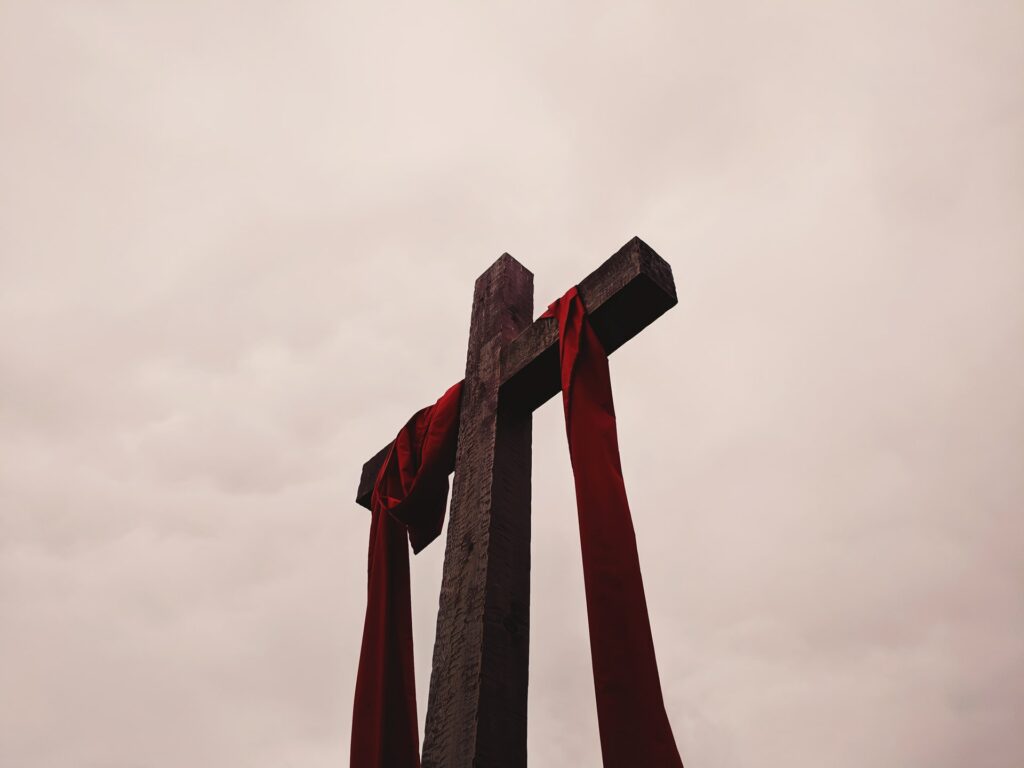Refuse to Fail
By faith Moses, when he was born, was hidden for three months by his parents, because they saw that the child was beautiful, and they were not afraid of the king’s edict. By faith Moses, when he was grown up, refused to be called the son of Pharaoh’s daughter, choosing rather to be mistreated with the people of God than to enjoy the fleeting pleasures of sin. He considered the reproach of Christ greater wealth than the treasures of Egypt, for he was looking to the reward. By faith he left Egypt, not being afraid of the anger of the king, for he endured as seeing him who is invisible. By faith he kept the Passover and sprinkled the blood, so that the Destroyer of the firstborn might not touch them. By faith the people crossed the Red Sea as if on dry land; but the Egyptians, when they attempted to do the same, were drowned. Hebrews 11:23-29
kept the Passover and sprinkled the blood, so that the Destroyer of the firstborn might not touch them. By faith the people crossed the Red Sea as if on dry land; but the Egyptians, when they attempted to do the same, were drowned. Hebrews 11:23-29
We must maintain a faith that refuses to fail in our vision of God (v. 27). Moses may have had an element of fear within him towards Pharaoh, but it was not a fear that kept him from obeying and persevering in his faith, because he saw ‘him who is invisible.” The Psalmist said, ‘I have set the LORD always before me; because he is at my right hand, I shall not be shaken” (Psalm 16:8). By keeping a vision of God always in front of us, we will be less tempted toward distraction by the ever-present sideshows of worldly opportunities. A faithful vision that sets God as its goal allows us to look beyond earthly treasures and temporary pains. It gives us a view of the eternal, and so Paul said, ‘For this slight momentary affliction is preparing us for an eternal weight of glory beyond all comparison, as we look not to the things that are seen but to the things that are unseen. For the things that are seen are transient, but the things that are unseen are eternal” (2 Corinthians 4:17-18).
We must have the faith to refuse to let the enemy have our homes.
Verse 28 says, ‘By faith he kept the Passover and sprinkled the blood, so that the Destroyer of the firstborn might not touch them.” There is a destroyer who would come and try to tear apart our homes. His mission is stated in John 10:10, ‘The thief comes only to steal and kill and destroy.” Without the protection of the blood of the Lamb over our homes, the destroyer of homes has easy access. The cure to the breakup of so many homes is not the profession of faith, but the physical application of the blood. Jesus’ response to the mission of the thief was, ‘I came that they may have life and have it abundantly” (John 10:10). God wants our lives and families to be full, but if we are not living under the constant power of the blood, we will find difficulties entering our homes, brought to us not by God in order to strengthen us, but attributable only to ourselves because we failed to protect our families through our obedience to Christ and the application of His blood.
Next, our faith must refuse to avoid the impossible. If Moses had not spoken to the water, the Red Sea would never have parted. If Jesus had not spoken to Lazarus, then Lazarus would never have risen. There are places that God is leading us and jobs that He is training us for that, to the natural eye, will seem impossible. But God specializes in the impossible. Paul reminds us, ‘No eye has seen, nor ear heard, nor the heart of man imagined, what God has prepared for those who love him” (1 Corinthians 2:9). The Lord is calling us to do things that the world cannot imitate. When the Red Sea opened, only the Israelites crossed over. When the Egyptians tried to do the same, they drowned. No one can authentically replicate the hand of God in His miracles, grace, calling, salvation, and Holy Spirit. People try all the time, thinking if they are loud enough in a worship service or if their television broadcast reaches far enough or if their building is large enough that this would be proof that the Spirit of God is blessing their ministry. Some churches still believe that the more people they have in their church the more God is behind them. If that were true, then every NFL football team that plays on Sunday would be considered most blessed by God. Just look at their numbers! At every football game we find music and clapping and hands being raised and ushers and even a collection of money. But that doesn’t make the stadium God’s house. Growing in numbers is not an indication of God’s blessing. Cemeteries are apt to grow in numbers also, but the members are not very effective for the kingdom of God.
Instead of following the world in our dress, music style, talk, and entertainment, we should spend time finding out where God would lead us.
When we do, then the world will notice and try to follow, but will find they cannot go where we are. The world will never be able to produce the same music and art, speak with the same spirit and affect the school systems the way Holy Spirit-led Christians can because they lack a very important item: the fire of God’s presence. It is time Christians took the lead so that the world tries to follow us, rather than the current trend, which has the Christians trying to imitate the world.
Finally, we must have the faith to refuse to seek the best of both worlds (v. 26). Moses made a choice in faith to seek God first. His decision shows us that worldly advantage does not always seem to be on the side of godliness, and that it is impossible to live in complete approval of both the world and God, for we can only serve one master. Moses had to choose sides, and he chose to live among slaves with God rather than to live among kings without Him. Moses could not be an Israelite and an Egyptian, the oppressed and the oppressor, the worshiper of the One True God and the worshiper of animals. Too often we think that God offers himself to us as a pie and asks us to take a piece, when He is really saying, ‘You can have the whole pie or none of the pie. There are no pieces of Me. I am an all or nothing God.” This is why Scripture does not say, ‘Love the Lord your God with 25 percent of your heart, 10 percent of your soul, 10 percent of your mind, and 5 percent of your strength, and spend the other 50 percent on yourself. And if the urge overcomes you, love your neighbor with the leftovers.”
When we choose God over the world, some of our decisions will seem like madness to the world.
Who in his right mind would rather live as a slave among the Israelites than as Pharaoh’s next in command? Nobody walks away from that much wealth and power in order to be counted among the outcasts. But Moses did. ‘He considered the reproach of Christ greater wealth than the treasures of Egypt, for he was looking to the reward” (v. 26). Moses knew of a greater power than Pharaoh’s, and of a throne that sat higher than a king’s, and of a compassion and mercy that extended to all who seek righteousness. And although he did not know who the Messiah would be, he knew enough  about Him to, as the author of Hebrews tells us, regard ‘the reproach of Christ greater wealth than the treasures of Egypt.”
about Him to, as the author of Hebrews tells us, regard ‘the reproach of Christ greater wealth than the treasures of Egypt.”
This was an echo of Christ’s attitude, for He left the throne of heaven to be counted among sinful men. It was Jesus ‘who, though he was in the form of God, did not count equality with God a thing to be grasped, but made himself nothing, taking the form of a servant, being born in the likeness of men. And being found in human form, he humbled himself by becoming obedient to the point of death, even death on a cross.” (Philippians 2:6-8).
Some may argue that Moses could have stayed in power and accomplished more than if he left Egypt. Really? If that is true, then why do billions of believers throughout the world know the name of Moses, while nobody knows the name of the Pharaoh who was king of Egypt over Moses?
The original readers of this letter were in danger of falling away from Christ because of the stigma that was associated with the name of Christ. The example of Moses challenges and encourages them to know that the greatest Hebrew prophet also bore the disgrace of Christ and considered it a greater treasure than all the treasures of Egypt. If they, like Moses, would weigh the issues on the scales of the eternal; if they would look forward and away to their reward; if they would take Moses and Christ as their examples, then they would know the security of their place in God and that God himself is more reward than the entire world could ever offer. It may seem that sometimes it takes greater faith to refuse than it does to believe, but they are actually two sides of the same coin. Refusing to follow the world is the manifestation of faith in God’s sovereignty and provision. And as Christians, whose job is to reproduce the image of Christ in our lives, we must all keep our eyes upon Jesus as our object and model, for only there we will we find the strength and desire to turn away from the pleasures of sin and find the faith to refuse all other offers.
